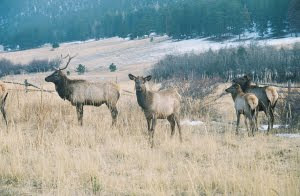
My most recent selection for Book Club was Close Range, Wyoming Stories, by E. Annie Proulx. This collection of short stories is brutal and intense, with characters that are a product of the harshness of a Wyoming winter--a long Wyoming winter. Proulx (pronounced "Proo") uses elegant language to describe the forlorn landscape and haunting lives, where few find happiness. Here's a few choice examples
Yet the stories don't just apply to Wyoming, but show us what can happen to people in an isolated society where civilized rules of behavior--morals--are replaced by the anarchy of too few social interactions, too few group support networks. It's every ranch, every family, every soul for himself or herself. Indeed in the story "Pair a Spurs" we learn that the state's unwritten motto is "take care a your own damn self" (p. 151)."The house trailer I rented was old. It was more of a camper you'd tow behind a car, so small you couldn't cuss the cat without getting fur in your mouth." (A Lonely Coast, p. 189)
". . . until you pull off the road to close your eyes or look up at sky punched with bullet holes." (A Lonely Coast, p. 189)
"There were times when I thought the Buckle [a bar] was the best place in the world, but it could shift on you and then the whole dump seemed a mess of twist-face losers, the women with eyebrows like crowbars, the men covered with bristly red hair, knuckles the size of new potatoes, showing the gene pool was small and the rivulets that once fed it had dried up." (A Lonely Coast, p. 200)
The final story in the collection is "Brokeback Mountain", a heart-wrenching love story, a modern-day tale of star-crossed lovers. But besides not figuring out how to live happily ever after, Jack and Ennis must hide their love. After all, this is Matthew Shepard country. And Matthew Shepard is no award-winning short story, he is real. (Proulx originally published Brokeback Mountain in the New Yorker in 1997, a year before the Shepard murder.) Like Matthew Shepard, Jack meets a brutal death. Tire accident or tire iron? Ennis is convinced it was death by tire iron murder: "So now he knew it had been the tire iron." (p. 282) In the end, Ennis accepts Jack's death, remembering their love as best he can. "There was some open space between what he knew and what he tried to believe, but nothing could be done about it, and if you can't fix it you've got to stand it." (p. 285)
Consider some other stories in this collection:
- The heartless castration of poor Ras in "People in Hell Just Want a Drink of Water". The story ends with "We are in a new millennium and such desperate things no longer happen. If you believe that you'll believe anything." (p. 117)
- The shooting melee in "A Lonely Coast". What was accident, what was dark impulse? "Friend, it's easier than you think to yield up to the dark impulse." (p. 207)
Here's another example. A two-part series in the LA Times "The Enclave: Blind Eye to Culture of Abuse", May 12, 2006, Part I and "The Enclave: Where Few Dare to Disobey", May 13, 2006 Part II by David Kelly and Gary Cohn, details the polygamous culture of Colorado City, Arizona. While polygamy itself is not inherently evil, the culture, yes, the people, in this community abuse children, abandon boys, encourage and indeed, force, very young girls to marry, and offer little relief to any who would protest. Individuals who want to act morally by protecting the children must buck the system and risk complete ostracism.
So Proulx's stories might take place in Wyoming, but they reflect a hidden darkness that humans share. Lest you despair that we're all doomed to be evil, look to your own village and look to your own God for love and support and moral guidance.
Next Entry: Have You Scene It?

No comments:
Post a Comment